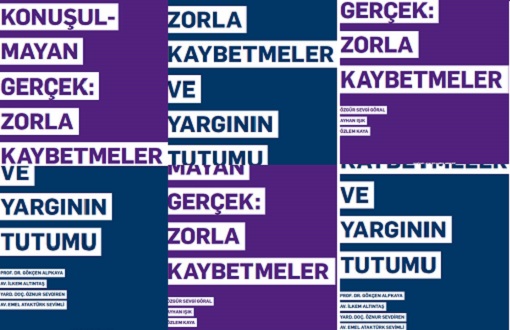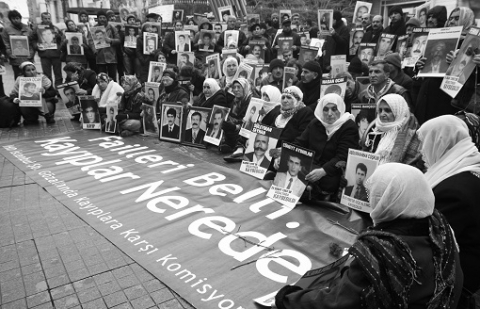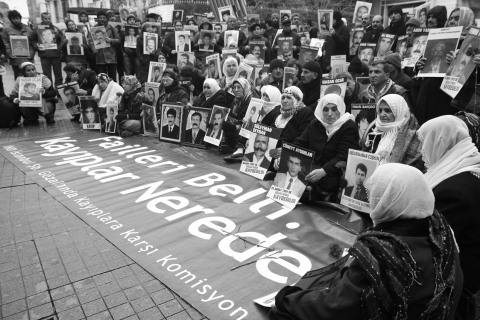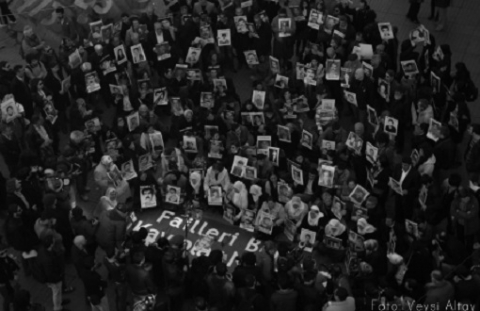
Two reports from the Truth Justice Memory Center concerning enforced disappearances
On July 11, the Truth Justice Memory Center held a press conference concerning two reports in which it explained the many aspects of the phenomenon of “enforced disappearance used as a state strategy to fight against terror” at Cezayir Restaurant Conference Hall.
These reports attempt to appraise the crime of “enforced disappearance” from the perspective of political powers, military and civil bureaucracies, the law, and victims; they also use the state’s “impunity” policies to analyze practices that qualify as crimes against humanity.

In Turkey, enforced disappearance, a strategy that has been used by states around the world against those it classifies as opponents, is an issue that has not been accounted for and responsible parties have not been tried.
The first of the reports, “Unspoken Truth: Enforced Disappearances,” is based on field research we conducted primarily in the districts of Cizre, İdil, and Silopi in the Şırnak province. It was prepared using the testimonies of 86 relatives of 69 disappeared persons. In addition to the relatives of the disappeared, we interviewed jurists, representatives of rights organizations, and relatives of the disappeared who live in Istanbul. The report was prepared by Özgür Sevgi Göral, Özlem Kaya, and Ayhan Işık.
According to the findings of our field research, enforced disappearances are carried out at the hands of soldiers, police, confessors, and village guards, authorized by the state apparatus. However, there is also a very powerful institutional collaboration that, at best, can be described as a silent avoidance, and at worst, actively perpetrates the crime of disappearance. Judicial organs do not pursue enforced disappearance; institutions that produce knowledge, such as universities and civil society organizations, are intentionally silent on the issue; and the mainstream media broadcasts information that criminalizes those who are actually victims of the problem.
In the second part of the report, we focused on the experiences of the relatives of the disappeared. The efforts of residents of the OHAL (state of exception) region to locate their disappeared loved ones told us a lot about the state apparatus, the ideal of justice, and the concept of citizenship. Perhaps the most tragic element of enforced disappearance is the state of constant expectation imposed on the relatives of the disappeared, of keeping their hopes up. The most basic request of the relatives of the disappeared is for the bodies to be found and for their loved ones to have graves.
The relatives of the disappeared continue to be viewed with contempt, their experiences are ignored, they have been beaten, tortured, and arrested in their search for their missing relatives, and they have been threatened with disappearance themselves. They have very concrete demands:
- The punishment of perpetrators by trial, making them realize the significance of their crimes, and without the benefit of amnesty;
- The state’s recognition of its crimes, accepting its premeditated role in the events and incidents;
- The recognition and acceptance of the crimes; the state’s apology to all of society, especially the relatives of the disappeared; and
- Material and spiritual reparations after the trials, acceptance of the crimes, and apology have been provided.
The report presented state-oriented recommendations aimed at uncovering practices of the ongoing war alongside institutionalized “state terror” as part of the continuing Kurdish question. It also suggested ways of speaking with a new ethics of memory.

Our second report on enforced disappearances, “Enforced Disappearances and the Conduct of the Judiciary”,examines legal practices related to the crime. The report aims to examine legal practices related to enforced disappearance through legal data we gathered, analyze human rights violations in this field from the perspective of the European Court of Human Rights (ECtHR) decisions, and facilitate discussion on the phenomenon through different legal arenas such as national and international criminal law, human rights law, and the law of war. The report consists of the following sections:
- The Conduct of the Judiciary in Enforced Disappearances – Emel Ataktürk Sevimli
- Enforced Disappearances in International Law – Prof. Gökçen Alpkaya
- The Recognition of Enforced Disappearance as a Crime Under Domestic Law and the Statute of Limitations: A Problematic of International Criminal Law-Asst. Prof. Öznur Sevdiren
- Enforced Disappearance Cases from the Perspective of the European Court of Human Rights – İlkem Altıntaş
The report examines legal documents concerning 227 disappeared persons. According to the analyses, a significant amount of the pending investigations (75%) have been delayed.
At the European Court of Human Rights (ECtHR), however, the scene is a bit different. Of the 102 cases concerning disappearance that have gone to the ECtHR, 78% of them were decided against Turkey, concluding that a violation had occurred.
According to the same documents, the remains of 67% of the disappeared have yet to be found.
In the report on the attitude of the judiciary, our suggestions are as follows:
- The UN “International Convention for the Protection of All Persons from Enforced Disappearance” should be signed and put into practice;
- An independent ‘Truth Commission’ should be established;
- All measures should be taken to put an end to the legal, administrative, and judicial dimensions of de facto ‘impunity’;
- Enforced disappearance should be defined in the law as a crime against humanity, and the law should explicitly specify that the ‘statute of limitations’ does not apply to these crimes;
- Those who are personally responsible at all levels, including those who gave orders to civil servants responsible for rights violations, as well as those who carried out the orders, should be held responsible and accountable in front of a court of law;
- The independence of the judge and prosecutors should be reinforced and the problem of judicial enforcement should be resolved;
- The state should share archival information concerning the investigation of incidents of political murders and enforced disappearance with the judiciary and with civil society institutions, and legislation on state secrets should be structured so that it can be held up to public scrutiny; and
- The relatives of victims should be provided with the possibility of rehabilitation and reparation.



